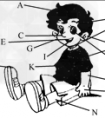根据首字母及汉语提示,完成下列单词的拼写,使句意明确,语言通顺。 1. He is really a _______(焦急的) because he lost his favorite book. 2. M_______ (医疗的) wor-九年级英语
35.be glad to do sth.高兴做某事
36.do a good thing (deed) 做一件好事
37.fall ill=be i11 生病,患病
38.take sb. to a hospital 把某人送到医院
39.rain heavily 下大雨
40.on the road 在公路上
41.not know what to do 不知道该做什么
42.just then 正在那时
43.come up 走进,上来
44.in front of 在……前面
45.thank sb. again and again 反复感谢某人
46.drive away (汽车)离开
run away 跑开
take away 拿走
47.right away 立刻
48.right now 此刻,刚才,现在
49.get home 到家 get there 到达哪儿 get here 到达这儿
50. yesterday morning 昨天晚上
51.leave the hospital 离开医院
52.no buses=not any buses 没有车
53.say to sb.对某人说 say to oneself 自言自语
54.fall off 跌落
55.need to get up early 需要早起床
56.hurt my arm 胳膊受伤
57.What's wrong with you?=What's the matter with you? 你怎么了?
58.do one's homework on the computer 在电脑上做作业
59.have four English lessons 上四节英语课
60.once a week 一周一次 twice a year 一年两次 three times a month 一个月三次
61.do more listening and speaking 做大量的听说练习
do some cleaning 扫除
do some washing 洗衣服
do some shopping 购物
62.make good progress in English 在英语方面取得很大进步
63.help a lot in our studies 在学习上给子很大帮助
64.teach sb. English 教某人英语
65.get to school 到达学校
66.give sb.lessons 给某人上课
67.ask sb.to do sth.要求某人做某事
ask sb.not to do sth.要求某人不要做某事
68.let sb. do sth.让某人做某事
1et sb. not do sth.让某人不要做某事
69.not……until 直到……才
70.make one's lessons interesting 使某人的课上的很有趣
71.tell sb. how to do sth.告诉某人怎样做某事
72.try to learn new things be oneself 设法靠自己学一些新的知识
73.want to be a history teacher 想成为一名历史老师
74.grow up 长大
75.in future 在将来
76.computer room (电脑)机房
77.language lab 语言室
78.finish middle school 中学毕业
79.want to become (be) a designer 想成为一名设计家
80.wish to be doctor 希望成为一名医生
81.an American boy 一个美国男孩儿
82.study in a high school 在高中学习
83.in Grade Eight 在八年级
84.finish primary school 小学毕业
85.start school at the age of seven
=begin to school when I was seven 七岁开始上学
86.move to Washington with his family 和他全家搬到华盛顿
87.be interested in 对……感兴趣
88.want to become a doctor of Chinese medicine 想成为一名中医
89.come here to learn Chinese 来这儿学习中文
90.a nice school 一所好的学校
91.instead of 代替
92.in many ways 在许多方面
93.be different from 与……不同
94.by the way 顺便说
95.come back home 回家
96.be sorry for 为…难过,遗憾
97.feel sorry for 为…难过,遗憾
98.burn away 燃烧没了
99.open the door 开门
100.take sb. in one's arms 拥抱某人
101.have some medicine 吃药
102.have a football match 进行一场足球比赛
103.have a meeting 开会
104.walk back 向后走
105.give sth. back to sb. 把某物还给某人
106. work through the night 通宵工作
107.get through the examinations=pass the exam 通过考试
108.happen to 发生
l09.knock at the door 敲门
110.want to do sth. 想做…
111.fall down 掉下来
112.begin to do sth. 开始做…
113.have some tea 喝茶
114.have sports 进行体育锻炼
115.have a bad coId 得了重感冒
116.have a good time 玩的很高兴
117.keep back 向后退
118.so…that 如此…以至于…
考点名称:实义动词的过去式
- 表示一般过去式的动词通常用动词的过去式形式来表示,而动词的过去式是在动词原形的基础上变化的。
动词的过去式可分为规则动词和不规则动词。 实意动词过去式变化规则:
注:以l结尾的动词,尾音节重读时,双写l,如control—controlled;分类 构成 例句 一般情况下 在词尾直接加ed ask—asked
work—worked以不发音的e结尾 只加d love—loved
dance—danced
以辅音字母加y结尾 变y为i,再加-ed try—tried
study—studied以一个元音字母和一个辅音结尾的
重读音节结尾的动词先双写末尾一个字母,再加ed stop—stopped
permit—permitted“-ed”的读音规则 1.在清辅音后面读[t],如:help—helped[helpt]
2.在浊辅音或元音后读[d],如:learn—learned
3.在[t]和[d]后读[id],如:want—wantedneed—needed
尾音节不重读时,双不双写都可以,如travel—traveled/traveled。
特例:picnic—picnicked,另外还有很多动词的过去式是不合乎上述规则的,常见的有:
常用的有:
begin—began, bring—brought, come—came, draw—drew,
drink—drank, drive—drove, eat—ate, feel—felt,
get—got, give—gave, go—went, grow—grew,
have (has)—had, keep—kept, know—knew, leave—left,
make—made, read—read, run—ran, say—said,
see—saw, sit—sat几个特殊实意动词过去式用法:
a.beat的过去式与原形同形:
beat(打击)
beat(过去式)
beaten(过去分词)
b.lie有规则变化和不规则变化两种,含义不同
lie,lied, lied(说谎)
lay, lain(躺,位于)c.hang有规则变化和不规则变化两种,含义不同
hang,hanged, hanged(处绞刑)
hung, hung(挂,吊)d. welcome(欢迎)一词是规则动词,不可误用为不规则动词
welcome welcomed, welcomed(正)
welcome, welcome(误)e.不要将不规则动词误用为规则动词
hit(打)
hit, hit(正)
hitted, hitted(误)- 实意动词过去式用法基本句式:
1.主+V-ed+宾+其它。。。(肯定句)
2.主+didn't+V原+宾+其它。。。
3.Did+主+V原+宾+其它。。。+?
4.回答:Yes,主语代词+did\No,主语代词+didin't.
5.特殊疑问句:特殊疑问词+一般疑问句。 - 实义动词的一般过去时态:
肯定句要使用动词的过去式,否定句和疑问句要使用助动词do和 does 的过去式 did.
肯定句为:
主语+动词过去式+宾语 如:
I went home at nine o'clock yesterday.
否定句:
主语+didn't +动词原形+宾语 如:
I didn't go home yesterday. He didn't tell me about you.
疑问句:
一般疑问句:
Did +主语+动词原形+宾语
- 最新内容
- 相关内容
- 网友推荐
- 图文推荐
| [家长教育] 孩子为什么会和父母感情疏离? (2019-07-14) |
| [教师分享] 给远方姐姐的一封信 (2018-11-07) |
| [教师分享] 伸缩门 (2018-11-07) |
| [教师分享] 回家乡 (2018-11-07) |
| [教师分享] 是风味也是人间 (2018-11-07) |
| [教师分享] 一句格言的启示 (2018-11-07) |
| [教师分享] 无规矩不成方圆 (2018-11-07) |
| [教师分享] 第十届全国教育名家论坛有感(二) (2018-11-07) |
| [教师分享] 贪玩的小狗 (2018-11-07) |
| [教师分享] 未命名文章 (2018-11-07) |






